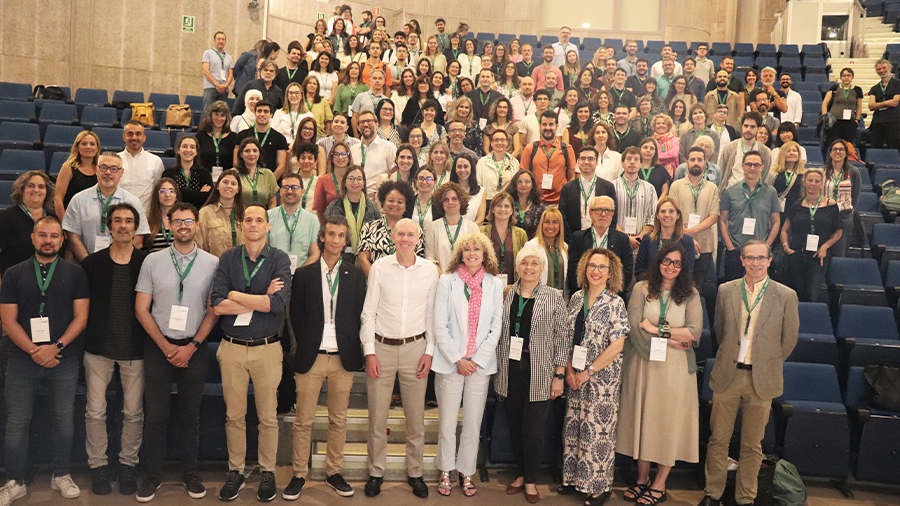Catalan universities defend knowledge transfer as the motor of innovation and social impact
Over 150 university professionals participated in the 3rd Catalan Universities Transfer Offices Conference, held on 3 June at the Auditorium of the UAB Faculty of Arts & Humanities.

For the third consecutive year, the transfer offices of the Catalan universities met to reflect on the connection between research and society and to generate spaces for debate, exchange and learning among professionals who promote collaboration with the socioeconomic environment from within the institutions.
The General Director of Knowledge Transfer and Society of the Government of Catalonia, Javier Selva, inaugurated the conference by highlighting the importance of knowledge transfer as a strategic pillar to make Catalonia one of the most innovative regions in Europe. “The Government of Catalonia's Strategic Plan to boost knowledge transfer is precisely committed to transforming the R+D+i system by prioritising transfer and public-private collaboration,” he explained.
Rosa Maria Sebastian, vice-rector for Innovation, Transfer and Entrepreneurship of the UAB, emphasised that “this conference has established itself as a benchmark event for university transfer professionals in Catalonia, offering a platform to share best practices, establish synergies and collectively rethink strategies for connecting academic research with the social and economic challenges of the country”.
Javier Selva, general director of Knowledge Transfer and Society of the Government of Catalonia, and Rosa Maria Sebastián, vice-rector for Innovation, Transfer and Entrepreneurship of the UAB.
Xavier Vallvé, director of the Office of Knowledge Transfer and Research Valorisation of the UAB, then presented indicators and results of knowledge transfer activities of Catalan public universities. From 2021 to 2023, 203 new patents were applied for, 211 transfer agreements were signed, generating €7.4M, and 35 spin-offs were created.
The keynote address was given by Simon Hepworth, director of Knowledge Transfer at Research England. Entitled “The Future of University Innovation, and how to get there”, Hepworth explored the evolution of university spin-offs, the challenges of funding to bring deep tech to maturity, and public policy to strengthen the innovation ecosystem, drawing on his experience at Imperial College London and the TenU organisation. “The future is a mission-driven university that integrates basic research, applied science, innovation and social justice, not as separate compartments, but as a continuous pipeline from the lab to real life,” he concluded.
The day continued with a session on communication strategies to generate impact in knowledge transfer by Ana Cano, project manager at Iuris.doc. Cano showed practical examples of formats and dissemination materials to make the transfer visible, understandable and relevant to the people who can transform it into impact: companies, the market and society.
The last session focused on how to design, explain and measure impact in research and transfer projects. Toni Bassaganyas from the Strategy Area of the CERCA Institution reviewed what we mean by impact and the implications it has on the whole research process. "It is necessary to corroborate the connection between research and impact, demonstrate the impact it produces¨, he stated. In particular, there must not be confusion between impact indicators and knowledge transfer or dissemination indicators. "The final goal when focusing on impact is that the research system provide possibilities of generating excellent research and that potential benefits translate into real changes for society."
L’acte, dut a terme amb el suport de la Xarxa d’Emprenedoria Universitària (XEU) i el Departament de Recerca i Universitats de la Generalitat de Catalunya, va comptar amb personal tècnic i de gestió de la Universitat Autònoma de Barcelona (UAB), la Universitat de Barcelona (UB), la Universitat Politècnica de Catalunya (UPC), la Universitat Pompeu Fabra (UPF), la Universitat de Girona (UdG), la Universitat de Lleida (UdL), la Universitat Rovira i Virgili (URV), la Universitat Ramon Llull (URL), la Universitat Oberta de Catalunya (UOC), la Universitat de Vic – Universitat Central de Catalunya (UVic-UCC), la Universitat Internacional de Catalunya (UIC Barcelona) i la Universitat Abat Oliba CEU (UAO CEU).
Juan Solís, CEO of Arvor, focused on how to measure the impact of research valorisation projects and how to prepare them at each stage to obtain funding and move them forward. “It is important to evaluate and forecast the impact of a project according to the stage of development it is in, according to its level of technological maturity,” he stressed.
The event, carried out with the support of the University Entrepreneurship Network (XEU) and the Ministry for Research and Universities of the Government of Catalonia, was attended by technical and management staff from the Universitat Autònoma de Barcelona (UAB), the University of Barcelona (UB), the Universitat Politècnica de Catalunya (UPC), the Pompeu Fabra University (UPF), the University of Girona (UdG), the University of Lleida (UdL), the Rovira i Virgili University (URV), the Ramon Llull University (URL), the Open University of Catalonia (UOC), the University of Vic - Central University of Catalonia (UVic-UCC), the International University of Catalonia (UIC Barcelona) and the Abat Oliba CEU University (UAO CEU).